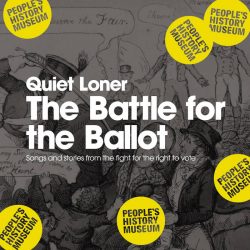
 I should have reviewed this record during the General Election campaign and it would have provided the perfect backdrop and context. It is an inspiring record, the result of Matt Hill’s stint as songwriter in residence at the People’s History Museum in Manchester – the national museum for democracy. His brief was to explore the story of universal suffrage and these songs tell those tales that are all but forgotten now. As our democracy is being syphoned away it is pertinent to remember the stories of the brave men and women who fought for a better society.
I should have reviewed this record during the General Election campaign and it would have provided the perfect backdrop and context. It is an inspiring record, the result of Matt Hill’s stint as songwriter in residence at the People’s History Museum in Manchester – the national museum for democracy. His brief was to explore the story of universal suffrage and these songs tell those tales that are all but forgotten now. As our democracy is being syphoned away it is pertinent to remember the stories of the brave men and women who fought for a better society.
Artefacts from the museum inspired the songs – the desk at which Thomas Paine wrote ‘The Rights of Man’ serves as the catalyst for ‘Nothing Less than Revolution’ (which bookends the record) and contains the most immediate melody, a call to arms. ‘The Dust of St. Peter’s Field’ tells the story of the Peterloo Massacre – it’s Hill at his most passionate and inflamed and to think that only 200 years ago, in this country people were killed for daring to call for reform. Among the songs calling for reform such as the rockabilly ‘Tear These Railings Down’ the plight of women is not overlooked. Tracey Browne takes the lead for ‘Hannah’ which tells the story of Hannah Mitchell, a suffragist who went to prison and on ‘Paint this Prison’ – which is culled from the prison diaries of suffragette prisoners – it frightens me to think that it was just a 100 years ago: it’s hard to comprehend that it was only in the General Election of 1929 that everyone had an equal vote. This is celebrated in ‘Election Day’ where an old man is able to take his family to vote together for the first time.
This record and the history behind it should be compulsory for the nearly third of the population who didn’t vote in the election – we’ve forgotten those brave men and women who fought for us all. This is a timely reminder of the often tragic history of our democracy, but it’s also a reminder of the song writing powers of Matt Hill. Thank you for this. It made me feel humble and inspired.
Summary
A brilliant evocation of the fight for British democracy


